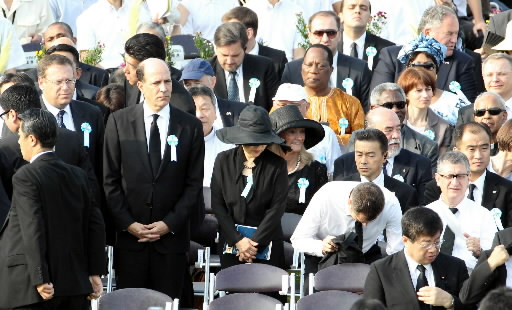Representatives from nuclear weapon states offer different reactions at 68th Peace Memorial Ceremony
Aug. 8, 2013
by Miho Kuwajima and Kaori Ogasawara, Staff Writers
Representatives from 70 nations and the European Union (EU) attended the Peace Memorial Ceremony held in Hiroshima Peace Memorial Park on August 6. Among the five major nuclear weapon states, the United States, Russia, France, and the United Kingdom sent representatives to the event. China, however, was absent for the fifth year in a row. Although a comment from John Roos, the U.S. Ambassador to Japan who will soon leave his post, was anticipated, he departed without offering any remarks.
It was the fourth consecutive year that a representative from the United States, the nation which dropped the atomic bomb, attended the ceremony. For Mr. Roos, it was the third time to attend, following the 2010 and 2012 ceremonies, and his expression was somber. After the ceremony in 2010, Mr. Roos issued a comment through the U.S. Embassy, but he did not release a statement in 2012 or this year. Although reporters sought his reaction after the ceremony, he made no reply.
Emiko Bungo, 83, a resident of Naka Ward who experienced the bombing while working as a mobilized student at the Hiroshima Central Telephone Exchange, said with regret, “It’s sad that he left without a word. If the U.S. ambassador had said something in the A-bombed city, it would have been a big boost for the cause of peace.”
The representatives from both the United Kingdom and France expressed their support for nuclear non-proliferation. U.K. Ambassador Tim Hitchens stressed his nation’s intention to be proactive in its efforts for nuclear disarmament, saying that the United Kingdom would reduce its nuclear arsenal by 25% by the year 2020. Francois-Xavier Leger, interim charges d’affaires of France, said that his country would also continue taking action to advance nuclear disarmament.
Although Hiroshima Mayor Kazumi Matsui expressed concern in his Peace Declaration over a nuclear energy agreement that the Japanese government is currently negotiating with India, saying that “It is likely to hinder nuclear weapons abolition,” the representative from India, a nuclear weapon state and a non-signatory to the Nuclear Non-proliferation Treaty (NPT), did not respond to interview requests from the media. The representatives from Russia and Pakistan, also a nuclear weapon state and a non-signatory to the NPT, would not respond to questions, either.
(Originally published on August 7, 2013)
Representatives from 70 nations and the European Union (EU) attended the Peace Memorial Ceremony held in Hiroshima Peace Memorial Park on August 6. Among the five major nuclear weapon states, the United States, Russia, France, and the United Kingdom sent representatives to the event. China, however, was absent for the fifth year in a row. Although a comment from John Roos, the U.S. Ambassador to Japan who will soon leave his post, was anticipated, he departed without offering any remarks.
It was the fourth consecutive year that a representative from the United States, the nation which dropped the atomic bomb, attended the ceremony. For Mr. Roos, it was the third time to attend, following the 2010 and 2012 ceremonies, and his expression was somber. After the ceremony in 2010, Mr. Roos issued a comment through the U.S. Embassy, but he did not release a statement in 2012 or this year. Although reporters sought his reaction after the ceremony, he made no reply.
Emiko Bungo, 83, a resident of Naka Ward who experienced the bombing while working as a mobilized student at the Hiroshima Central Telephone Exchange, said with regret, “It’s sad that he left without a word. If the U.S. ambassador had said something in the A-bombed city, it would have been a big boost for the cause of peace.”
The representatives from both the United Kingdom and France expressed their support for nuclear non-proliferation. U.K. Ambassador Tim Hitchens stressed his nation’s intention to be proactive in its efforts for nuclear disarmament, saying that the United Kingdom would reduce its nuclear arsenal by 25% by the year 2020. Francois-Xavier Leger, interim charges d’affaires of France, said that his country would also continue taking action to advance nuclear disarmament.
Although Hiroshima Mayor Kazumi Matsui expressed concern in his Peace Declaration over a nuclear energy agreement that the Japanese government is currently negotiating with India, saying that “It is likely to hinder nuclear weapons abolition,” the representative from India, a nuclear weapon state and a non-signatory to the Nuclear Non-proliferation Treaty (NPT), did not respond to interview requests from the media. The representatives from Russia and Pakistan, also a nuclear weapon state and a non-signatory to the NPT, would not respond to questions, either.
(Originally published on August 7, 2013)








